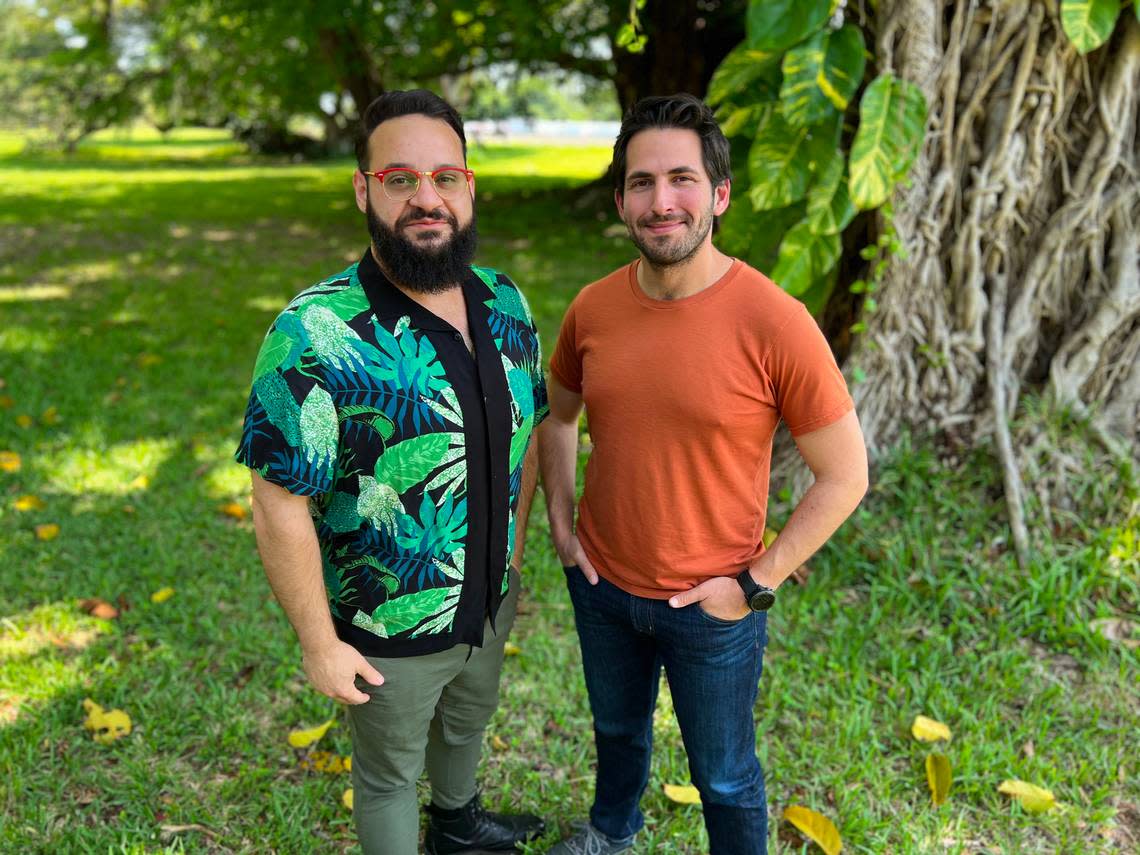Walter Mercado, Menudo, now ‘Sábado Gigante’: Miami producers focus on Hispanic icons
Alex Fumero and Kareem Tabsch made a Netflix documentary about Walter Mercado, which was an intimate portrait of the late Puerto Rican astrologer. Now they will do the same with Don Francisco, to tell the story of Hispanics through the show “Sábado Gigante,” broadcast on Univision until 2015.
Both Miami-based Cuban-American filmmakers have teamed up with Mario Kreutzberger aka “Don Francisco,” for the documentary series “Gigante,” which Disney’s Onyx Collective bought and will stream on Hulu.
“Gigante” will not shy away from serious issues such as racism in the Hispanic media — very few Afro-Latinos appeared on “Sábado Gigante” — or sexism, seen in segments like “Mueve la colita (Move your tail),” which was an audience favorite but “objectified” women, the filmmakers point out. They say they have the full support of Don Francisco, who will open his archives for the series.
“If we’re going to examine one part of our culture, we have to examine it all, the good and the bad,” Tabsch said.

A ‘Trojan horse’ for Hispanics
Fumero and Tabsch, producer and co-director respectively of the documentary “Mucho, mucho amor, The Legend of Walter Mercado,” explain that “Gigante” will not be a biography of Kreutzberger, but instead intends to delve into how a program that broadcast for five decades is linked to the history and development of Hispanics in this country.
“’Sábado Gigante’ played an important role in turning the Hispanic market into a people,” says Fumero, indicating that the concept of “Hispanic,” which began as a marketing label, deepened and became a group that gained importance in multiple aspects in the United States.
In a meeting with the executive who later bought “Gigante” in which the producers explained the essence of the series, that executive called the program a “Trojan horse.” That ended up being the name of the company that Fumero and Tabsch created to carry out their film projects.

“The series is about the history of the show and a bit of Mario’s life, but the story is really about the Latino identity; how certain entrepreneurs, activists and politicians came together to create a market that didn’t exist before,” said Fumero.
“Hispanic-American culture began as a market and ended up as a people,” Fumero said, pointing out that shows like Don Francisco’s brought together Cubans from Miami, Chicanos, Nuyoricans and Hispanics from other parts of the country.
“Those Hispanic programs and channels were the internet of that time. How do you think a ‘yuca’ Cuban-American like me found out who Selena, a Chicana from Texas, was?” said Fumero.
United by language
The program’s slogan was “Separated by distance, united by the same language,” which underlined the unifying power of the Spanish language.
“The show created bonds of brotherhood between people with different experiences, ages and places,” said Miami-born Tabsch, who is of Cuban and Arab descent and grew up with the show.
“ ‘Sábado Gigante’ was a presence in our homes. It was a unique and crazy show. It had an incredible mix; during the three hours of each show, you could see a very good singer, followed by a very bad one. Then came ‘La Cámara Viajera (The Traveling Camera),’” recalls Tabsch, referring to one of the most popular segments of the show, “which followed Don Francisco to Israel or China.”
Several Latin American presidents, as well as George W. Bush and Barack Obama, were also interviewed on the variety show, Tabsch points out, recalling that serious personalities and topics could come immediately after a humorous segment.
The filmmakers acknowledge that they always wanted to make a documentary about the show, but the initial push came from another Miamian, Andrew Hevia, one of the producers of the 2017 Oscar-winning film “Moonlight.” Hevia introduced them to Don Francisco’s grandson, Ian Numhauser, who is a producer in Los Angeles and shares that credit with Fumero and Tabsch in “Gigante” with the company Foton.Pictures.
Kreutzberger, 81, said he is at the ideal moment in his life to look back. “I have the complete perspective not only of my 60 years as a professional, but also, I am where I can fully analyze the record-breaking career of Don Francisco and ‘Sábado Gigante’ and what it meant to so many people. I am more than happy to have the opportunity to tell the story.”
Menudo: Forever Young
Trojan Horse also produced the HBO Max series about Menudo, which premiered on June 26.
Fumero explains that for “Menudo: Forever Young,” they interviewed 15 members of the group, trying to avoid “the showbiz angle.”
“Behind every show there is a lot of sacrifice and pain,” said Fumero, explaining that very strong ties were formed between the members of the group, even among those who were not in the group at the same time. Menudo was the inspiration for the boy bands that later popped up in the United States.
“Menudo: Forever Young” is directed by Puerto Rican Angel Manuel Soto, who will direct a film about a Latino superhero, “Blue Beetle,” now in production.

Tabsch has also reunited with Dennis Scholl, with whom he filmed the magnificent documentary “The Last Resort,” about Jewish residents in Miami Beach, to film another documentary on the life of the photographer and pin-up model Bunny Yeager, Miami’s adopted daughter.
Tabsch, founder of O Cinema, which operates out of the Miami Beach Cinematheque, also co-hosts with producer Joey Daoud the podcast Paradise Lost, Crime in Miami, about famous crimes that occurred in Miami, such as the Versace murder, the attack by Rudy Eugene, called “The Miami cannibal,” and the “Godmother of cocaine,” Griselda Blanco, who terrorized the city and is considered responsible for ordering the murders of 200 people.
